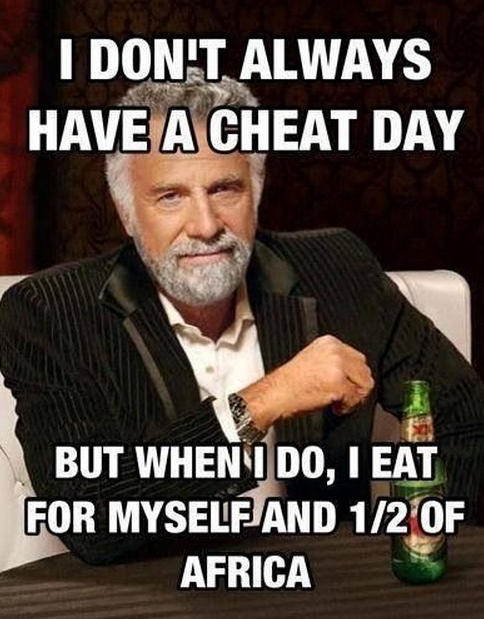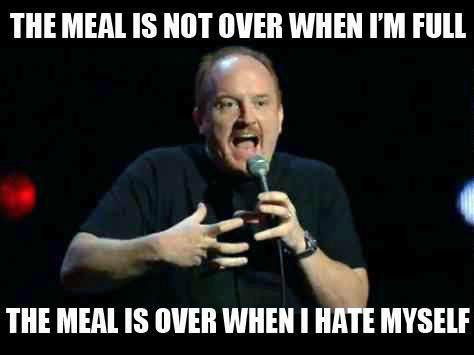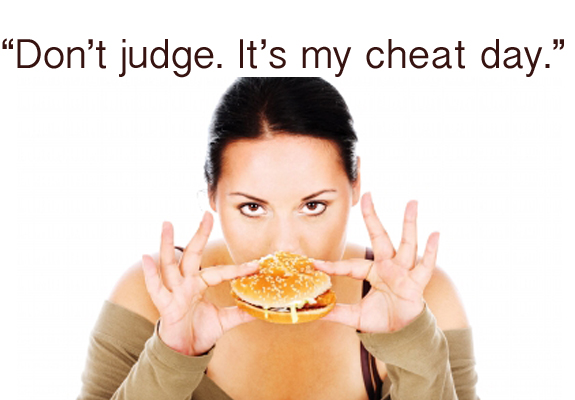Periodically I hear different people mentioning “cheat days” in regards to their food and it has perplexed me enough to think deeply into the concept.

To cheat means to defraud, swindle, deceive, elude or to violate rules. This leads me to think that someone who uses “cheat days” has a pretty strict set of rules in place for themselves.
Perhaps “cheat days” are required when dieting for weight loss, rather than when transitioning into a healthier lifestyle. There is nothing wrong, per se, with that approach, however I think that there’s a more sensible and sane way to approach positive and desired change that will serve us all better in the long run.
A healthier lifestyle isn’t just about losing (or gaining) weight. It’s about managing and reducing anxiety and stress, exercising enough, sleeping abundantly, clean air, water, and food, sunshine, and genuine contentment through community, relationships, and play. We get healthy to find weight and body balance. We don’t force our body into a certain shape or size to get healthy.

If our personal rules about our eating are too tight or rigid and if the only way we can endure them is to schedule in a day to violate those rules, perhaps this isn’t the best plan to meet personal long-term wellness goals.
Maybe the better plan is to loosen the rigid rules a bit so that we don’t feel the need to cheat. Perhaps we need to slow the pace and integrate a healthier lifestyle that we will always (or almost always) and joyfully keep rather than jumping into a temporary diet that is dreadful and requires cheating.

When food choices are right for you, you will feel energetic, clear, light, active, joyful, and in ease. You will not feel forced into something. It’s like falling in love. It’s easy, nutritious, colors look more vibrant, tastes are more succulent, and you are excited about being with your food choices.
When we healthfully commit to another person, we don’t build in “cheat days.” Maybe if we’re forcing ourselves to be with someone we don’t love or like, “cheat days” might be necessary….but, gosh, what an awful arrangement that would be. I would feel enslaved or owned and would “cheat” in one way or another just to survive the misery.

When eating, I’m not looking to just survive. I’m looking to thrive joyfully and easily. This takes time just like learning how to live and love in long-term relationships with other people. With food we’re in relationship with ourselves, as positive food choices are a form of acute self-care.
When we commit to someone we love and adore, staying true is not difficult. When we commit to ourselves and our wellness, staying true to a certain way of eating is not hard or punishing.
Will there be temptations? Only if you are not 100% clear about your commitment…that goes for relationships and food!

I am committed to eating a high-fruit plant-based diet at least 80% of the time. I know, right now in my life, that aiming to eat this way 100% of the time instead would set me up for failure and frustration.
Does that mean that the 20% represents my “cheat days?” Nope, I don’t feel like I’m cheating on anything. I simply feel that I’m being human and knowing myself well. Does that mean that I eat crap 20% of the time. Nope. I still eat well, but it might be food from a restaurant instead of home or something that is not entirely whole food, plant-based like some vegan junk food. I relax a bit and feel no guilt.
Perhaps it’s the term “cheat day” that hangs me up. To me it implies that the pressure of the daily commitment is intolerable and that compacted, limited relief is essential to survival.

If the demands or expectations you have made of yourself (like “lose 30 pounds by next Saturday”) are irrational, impossible, or dangerous you will feel like you’re holding your breath until you can make a gigantic exhale on a “cheat day,” whereby undoing any good you may have acquired before then. This is destructive perfectionism at its worst.
Rather than factoring in a “cheat day,” how about relaxing into your wellness goals, getting clear on your commitment (why and to what), and foregoing any violation of rigid rules.

As you begin to transition into a healthier lifestyle, you may need some reward or you may need to dip back into your old lifestyle for assurance, however refrain from calling it a “cheat.” I think this word benefits no one as it is so full of shame and guilt. None of us need more of that!
Call it instead, “the weekend.” Stay committed to your goals and ideals 80% of the time or more, and then have a meal or two or three where you relax, widen the parameters, and enjoy some foods that are no longer on your new and improved daily menu. BUT do not go hog wild. That would be a form of scheduled self-defeat and self-sabotage and sooner or later it won’t feel good at all. You’ll undo your good work and certain addictive foods (sugar, alcohol, caffeine, meat, cheese) may totally suck you back into the old ways you’re wanting to leave behind.

Make a commitment of love and support to yourself. Understand why you want to make improved choices. Is it for your health to prevent or reverse disease? Is it for the welfare of the animals? Is it to protect environmental resources? Do you want to experience a higher vibrational life path? Live as long as possible to enjoy the life and people you love? The one reason that holds the least anchoring is for vanity, to lose some weight, look good, get attention. This is not wrong, but try to go deeper for easier commitment. Vanity is fickle.
To me someone who eats a certain way to express their compassion and gratitude is far sexier than someone who starves themselves all week and binges on Saturday. If you feel the need to cheat you’re on the wrong food plan. Reassess your approach or work with a coach to create a better plan.

Get clear and the “cheat day” with a promise of a hot fudge sundae will hold no charmed spell over you. When your commitment is clear, you’ll be able to walk through a French bakery enjoying the smells but not partaking, just as you might enjoy the scent and vision of that fabulous specimen of the opposite sex who just walked past without you being tempted to violate a commitment that you’ve made to yourself or another person.
Life is grand. Enjoy the scenery. All the scenery. Yet be clear about your goals and commitments as they will guide you well.
Additional Resources

{ 8 comments… read them below or add one }
I absolutely love this post, and totally agree. Recovering from ED’s and Cheat Days do not work well together – in fact it was this type of idea that has triggered me in very negative ways in the past. My ED self loves the idea of earning food, it loves to be strict then binge. That is sick! I want to be healthy ALL the time and this means eating in a way that I don’t have to cheat on. Just like you said so perfectly and lovingly, thank you, Carla!!!
So glad this resonated with you Danielle! A “cheat day” certainly can feel and look like a binge episode which doesn’t serve anyone well, especially those with and recovering from eating disorders. I agree! Thank you for reading & commenting!
wow Carla So well said. thank you once again.
You are so welcome sweet Kathleen! xo.
The analogy of cheating on a partner in a relationship really resonates with me. I never thought of it that way but it makes sense! Very helpful to put additional perspective. Really great post Carla!
I’m so glad you liked that part Angie!!! An early critic of my “rough draft” (aka mental notes) urged me to leave it out. I liked it and thought it pertinent. Glad you did too!
This is why I believe in moderation. No guilt. A realistic diet. Vegans may not like this but I eat chicken once a week, fish, once a week, a cup of coffee every day, an ounce or at most 2 ounces of vodka every day, but nothing in a regimented way. I enjoy my diet and more important take delight in life in the now.
I think you have a reasonable conception of moderation Paul which most people don’t have. So many people eat animals three times a day.
“Because moderation may mean different amounts and/or frequencies for different people, it is hard to say what eating everything in moderation means for everyone. There is no set, working, or useful definition. I think most people use this phrase to justify eating whatever it is they want to eat and this is usually not the path to optimal wellness.
The truth about eating everything in moderation indiscriminately is that it creates disease in moderation: heartburn, constipation, excess weight gain, high cholesterol, high blood pressure, diabetes, and some cancers.”
https://www.carlagoldenwellness.com/2015/11/09/everything-in-moderation/